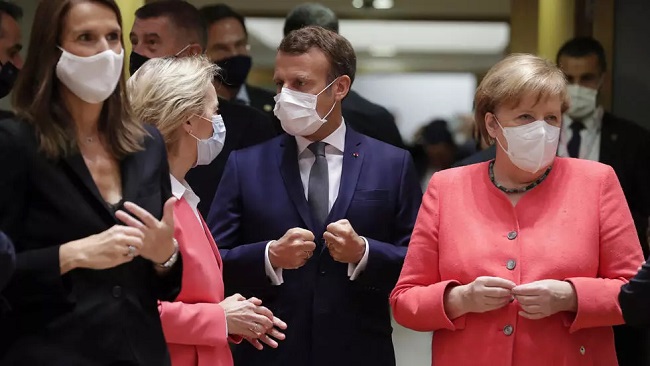EU leaders open tortuous talks on controversial Covid-19 rescue plan
European leaders hunkered down on Friday for two days of tortuous negotiations to thrash out the terms of a huge post-coronavirus economic rescue plan.
Europe is in the depths of its deepest recession since World War II and the 27 leaders are seeking common ground on the terms of a 750-billion-euro stimulus package that would help lift those hardest hit by the pandemic.
There is stern resistance from a group of richer and smaller nations led by the Netherlands and Austria that are loath to hand out cash to countries such as Spain or Italy they see as too lax with public spending.
Germany’s Chancellor Angela Merkel turned 66 on Friday and as she and her colleagues began this first in-person summit since February, they gave her gifts and exchanged elbow bumps instead of handshakes.
But the high spirits quickly turned sombre once the talks began, with leaders taking their places in an EU headquarters with reduced staff and social distancing imposed.
“The differences are still very, very large and I cannot therefore predict whether we will be able to reach an agreement this time,” Merkel said as she arrived.
“It would be desirable, but we also have to face reality,” she said. “That is why I expect very, very difficult negotiations.”
France’s President Emmanuel Macron described it as a “moment of truth” before beginning the first session of talks that diplomats described as cordial but slow.
Merkel and Macron are backing a recovery package made up of a mixture of loans and subsidies to member states to revive economies shattered by the virus and preventive lockdowns.
“It’s our European project which is in play here,” Macron warned, before meeting the Netherlands’ Prime Minister Mark Rutte — who is holding out against doling out cash without tough conditions and an effective power of veto over national rescue plans.
Difficult days
“Solidarity, yes” Rutte said of countries that don’t have the budget to stoke a meaningful recovery.
“But at the same time, you can also ask those countries to do everything possible to solve this yourselves the next time. And you do this through reforms, in the labour market, in pensions etc.”
After around eight hours of talks the leaders broke up to meet in smaller groups, planning to reconvene for a working dinner at 8:00pm (1800 GMT).
The summit is set to run into Saturday and perhaps even Sunday, but few here are confident of a breakthrough, despite the tight timetable, so another summit may well follow later this month.
One diplomat said they expected Friday to conclude with summit host Charles Michel, the president of the European Council, presenting a fresh proposal, which the leaders would consider overnight before starting again on Saturday.
Michel has tried to create a sense of momentum after previous coronavirus-era videoconferences served only to underline the leaders’ differences.
But Rutte put the chance of success this weekend at less than 50 percent.
Loans or grants?
Michel’s current draft plan foresees a recovery package, made up of 250 billion euros in loans and 500 billion in grants and subsidies that would not have to be repaid by the recipient member states.
The Netherlands has emerged as the most likely hold out, but Rutte’s position is backed to varying degrees by fellow members of the so-called “Frugal Four” — Sweden, Denmark and Austria.
Austrian Chancellor Sebastian Kurz said he and his allies would reject anything leading to a “permanent ‘Transfer Union’,” an allusion to a centralised state comparable to the United States.
The frugals want any loans or grants to come with strict conditions attached to ensure that heavily-indebted countries carry out labour market reform. This is furiously opposed by the south.
“If the money is not used to invest in the future, if it does not go hand in hand with necessary reforms in states that are simply broken in their systems… then all this will fizzle out,” Kurz warned.
Both Michel and Merkel, whose country has just taken on the rolling six-month presidency of the EU, will struggle to broker any compromise — one diplomat quipped that they were trying to “defrugalise” the debate.
This package is in addition to the planned 1,074-billion-euro seven-year EU budget from 2021 to 2027 that the leaders must also agree in the coming weeks or months.
Source: AFP





